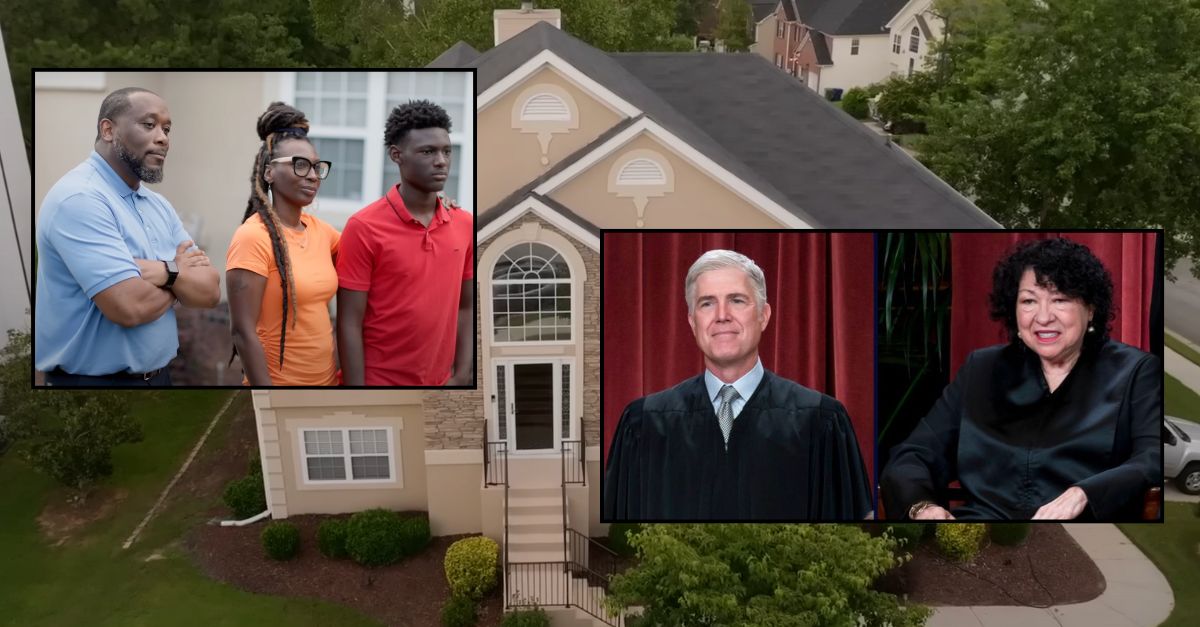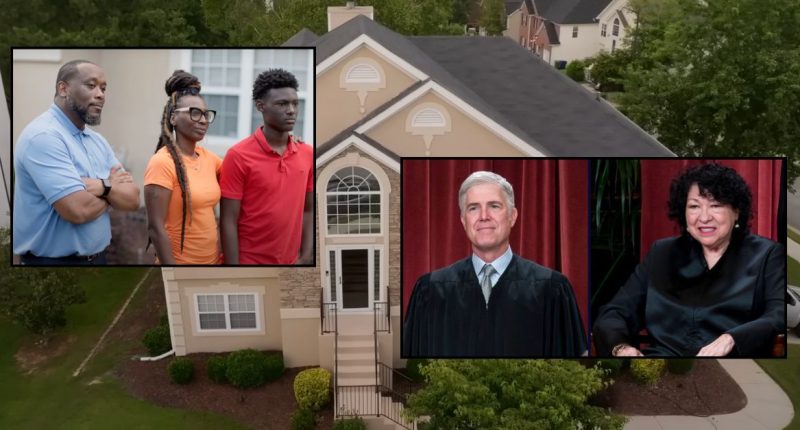
Background: The Martin-Cliatt family home in Atlanta, Georgia (Institute for Justice). Inset top, left to right: Hilliard Toi Cliatt, Curtrina Martin, Martin’s son Gabe (Institute for Justice); Inset, bottom: Left: Justice Neil Gorsuch. Right: Justice Sonia Sotomayor (Erin Schaff-Pool/Getty Images).
The U.S. Supreme Court on Thursday unanimously revived an Atlanta family’s lawsuit over a “predawn” wrong-house raid carried out by an FBI SWAT team looking for suspected gang members in Georgia.
Love true crime? Sign up for our newsletter, The Law&Crime Docket, to get the latest real-life crime stories delivered right to your inbox.
In the early morning hours of Oct. 18, 2017, a SWAT team burst through the front door of the home of Curtrina Martin, Hilliard Toi Cliatt, and Martin’s son Gabe, who was 7 years old at the time. As Law&Crime previously reported, the team tossed a flash-bang grenade as one SWAT officer announced their presence. Martin and Cliatt hid in the bedroom closet, thinking their home was being burglarized, before an officer dragged Cliatt onto the bedroom floor with guns pointed at him. Meanwhile, Martin fell into the closet while another SWAT team member pointed a gun in her face and yelled for her to keep her hands up. Gabe was separated from both adults while the team executed the warrant.
The family’s lawsuit had been dismissed by the district court in Georgia on qualified immunity grounds, and the U.S. Court of Appeals for the 11th Circuit agreed, taking the unusual position that the lawsuit was barred by the Constitution’s supremacy clause, which generally presumes that federal law takes precedence over conflicting state law. The family appealed to the Supreme Court, and in a unanimous decision, the high court held that the family can get another hearing at the U.S. Court of Appeals for the 11th Circuit on their intentional-tort claims.
Although the federal government is usually immune from lawsuits, the Federal Tort Claims Act (FTCA) waives that immunity in certain circumstances, including when a plaintiff has a state-law claim stemming from a government official’s performance of a discretionary duty that advances federal policy. With the family’s appeal, the Supreme Court justices were asked to consider whether the mistaken warrant execution was a “discretionary duty” on the part of the officers; under the FTCA, the “discretionary function exception” protects federal agents from liability for routine judgment calls.
Justice Neil Gorsuch penned the opinion of the court and vacated the dismissal of the case.
The justice spelled out what the 11th Circuit must do once the case is remanded, including an evaluation of whether the discretionary function exception of the FTCA “bars either the plaintiffs’ negligent-or intentional-tort claim” and grants immunity to the government.
Gorsuch also made clear that the government shouldn’t have been able to dodge the FTCA suit at the 11th Circuit on the strength of the supremacy clause.
“The FTCA is the ‘supreme’ federal law addressing the United States’ liability for torts committed by its agents,” he added.
In a concurrence joined by Justice Ketanji Brown Jackson, Justice Sonia Sotomayor wanted to “underscore that there is reason to think the discretionary function exception may not apply to these claims,” meaning the government would not be able to shield itself from liability.
Institute for Justice senior attorney Patrick Jaicomo, who represents the plaintiffs, said in a statement after the ruling that SCOTUS was “right to let the Martin family’s case move forward for the FBI’s botched raid of their home.”
“The Court’s decision today acknowledged how far the circuit courts have strayed from the purpose of the Federal Tort Claims Act, which is to ensure remedies to the victims of federal harms—intentional and negligent alike,” he said. “We look forward to continuing this fight with the Martins in the Eleventh Circuit and making it easier for everyday people to hold the government accountable for its mistaken and intentional violations of individual rights.”
In April, both Gorsuch and Sotomayor appeared reluctant to give immunity to the FBI agents involved in the wrong-house raid.
“You might look at the address of the house before you knock down the door,” Gorsuch remarked during oral arguments.
“How about making sure you’re on the right street?” Gorsuch also asked. “Just the right street? Checking the street sign? Is that asking too much?”
The court heard that the FBI had scoped out the target location before the raid but that a GPS directed them to a nearby, similar-looking home — the wrong home. Once the lead officer on the case realized that it was the wrong house, he apologized to the family, but the damage was done and the lawsuit lives on nearly eight years later.
Elura Nanos contributed to this report.







